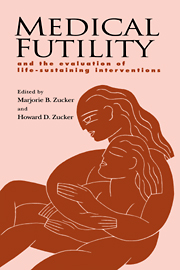Book contents
- Frontmatter
- Contents
- Preface
- Foreword
- Contributors
- 1 Medical futility: a useful concept?
- 2 Death with dignity?
- 3 Physicians and medical futility: experience in the critical care setting
- 4 Physicians and medical futility: experience in the setting of general medical care
- 5 Futility issues in pediatrics
- 6 Medical futility: a nursing home perspective
- 7 Alternative medicine and medical futility
- 8 How culture and religion affect attitudes toward medical futility
- 9 When religious beliefs and medical judgments conflict: civic polity and the social good
- 10 Conflict resolution: experience of consultation-liaison psychiatrists
- 11 Ethics committees and end-of-life decision making
- 12 The economics of futile interventions
- 13 Medical futility: a legal perspective
- 14 Professional and public community projects for developing medical futility guidelines
- 15 Community futility policies: the illusion of consensus?
- 16 Not quite the last word: scenarios and solutions
- Index of cited authors, cases, and statutes
- Subject index
16 - Not quite the last word: scenarios and solutions
Published online by Cambridge University Press: 11 September 2009
- Frontmatter
- Contents
- Preface
- Foreword
- Contributors
- 1 Medical futility: a useful concept?
- 2 Death with dignity?
- 3 Physicians and medical futility: experience in the critical care setting
- 4 Physicians and medical futility: experience in the setting of general medical care
- 5 Futility issues in pediatrics
- 6 Medical futility: a nursing home perspective
- 7 Alternative medicine and medical futility
- 8 How culture and religion affect attitudes toward medical futility
- 9 When religious beliefs and medical judgments conflict: civic polity and the social good
- 10 Conflict resolution: experience of consultation-liaison psychiatrists
- 11 Ethics committees and end-of-life decision making
- 12 The economics of futile interventions
- 13 Medical futility: a legal perspective
- 14 Professional and public community projects for developing medical futility guidelines
- 15 Community futility policies: the illusion of consensus?
- 16 Not quite the last word: scenarios and solutions
- Index of cited authors, cases, and statutes
- Subject index
Summary
In 1995, the editors of this book asked a group of outstanding scholars and clinicians to consider the concept of medical futility with 1995 eyes – to discuss current understanding, practices, and concerns about this complex, emotionally fraught, multifaceted subject. This is a timely consideration because reaching consensus about medical futility paradigms and consistently applying them has become increasingly challenging. The health care system's exploding technologic capacity, soaring health care costs, greater focus on end-of-life treatment decisions, and expanding concerns about blending health care consumer empowerment with community needs are making the futility debate more and more contentious.
In his well-considered summary of a 1993 professional meeting dedicated to the question of medical futility, Pearlman (1994) raises a threshold question. “Why,” he asks, “has medical futility become a battleground between physicians and patients (or their family members), rather than an area for thoughtful deliberation and negotiation?” The answer, or rather answers, to Pearlman's question lie in the pivotal concepts and concerns articulated at the meeting that he summarized (Fins 1994) and in the present volume. These publications discuss the most likely future scenarios for our nation's approach to the question of medical futility.
Summary of preceding chapters
Because the concept of medical futility and models for its application are so complex and the subject is so emotionally laden, many experts question the usefulness of the concept.
- Type
- Chapter
- Information
- Medical FutilityAnd the Evaluation of Life-Sustaining Interventions, pp. 179 - 192Publisher: Cambridge University PressPrint publication year: 1997

